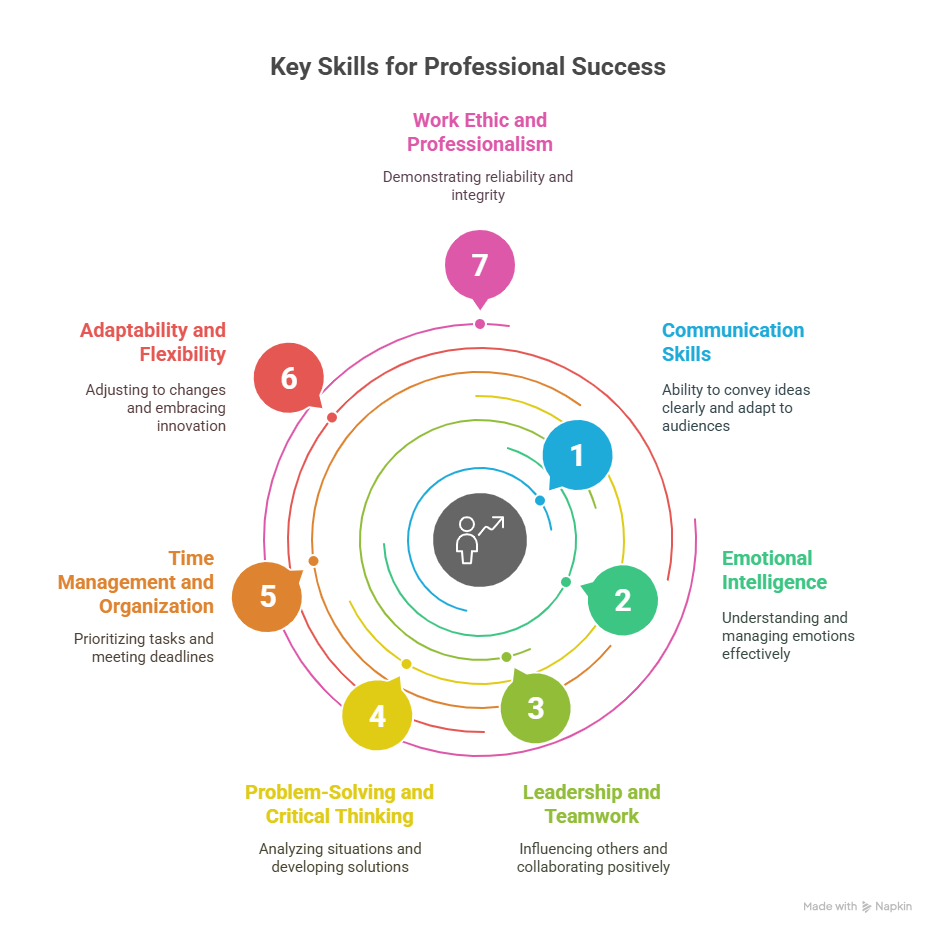The Role of Soft Skills in Career Growth
In today’s rapidly evolving workplace, technical expertise alone is no longer enough to guarantee career advancement. While hard skills might get you through the door, it’s your soft skills that will determine how far you climb the corporate ladder. These intangible yet invaluable abilities have become the differentiating factor between good employees and exceptional leaders.
Understanding Soft Skills: The Foundation of Professional Excellence
Soft skills, also known as interpersonal or people skills, are the personal attributes and behavioral competencies that determine how effectively you interact with others, solve problems, and navigate workplace challenges. Unlike technical skills that are job-specific and measurable, soft skills are transferable across industries and roles, making them incredibly valuable in today’s dynamic job market.
Essential Soft Skills That Drive Career Success
Communication Skills The ability to convey ideas clearly, listen actively, and adapt your communication style to different audiences forms the backbone of professional success. This includes verbal communication, written correspondence, presentation skills, and non-verbal communication.
Emotional Intelligence Understanding and managing your own emotions while recognizing and responding appropriately to others’ emotions. This skill encompasses self-awareness, empathy, social awareness, and relationship management.
Leadership and Teamwork Even if you’re not in a formal leadership position, the ability to influence others, collaborate effectively, and contribute positively to team dynamics is crucial for career advancement.
Problem-Solving and Critical Thinking The capacity to analyze situations objectively, think creatively, and develop innovative solutions to complex challenges. This includes analytical thinking, decision-making, and adaptability.
Time Management and Organization Successfully prioritizing tasks, meeting deadlines, and managing multiple projects simultaneously while maintaining quality standards.
Adaptability and Flexibility The willingness and ability to adjust to changing circumstances, learn new processes, and embrace innovation in an ever-evolving workplace.
Work Ethic and Professionalism Demonstrating reliability, integrity, accountability, and a positive attitude consistently across all professional interactions.

Why Employers Prioritize Soft Skills in Today’s Market
The Changing Nature of Work
Modern workplaces are increasingly collaborative, diverse, and technology-driven. Automation has taken over many routine tasks, leaving humans to focus on activities that require creativity, emotional intelligence, and complex problem-solving. In this environment, soft skills have become more valuable than ever.
Building Stronger Teams and Company Culture
Employers recognize that employees with strong soft skills contribute to better team dynamics, improved workplace culture, and higher overall productivity. These individuals can bridge communication gaps, resolve conflicts effectively, and foster positive working relationships that drive organizational success.
Customer-Centric Business Environment
In today’s service-oriented economy, the ability to understand customer needs, communicate effectively, and build relationships directly impacts business outcomes. Employees with strong interpersonal skills can enhance customer satisfaction, leading to increased loyalty and revenue.
Leadership Pipeline Development
Organizations are constantly seeking individuals who can grow into leadership roles. Soft skills like emotional intelligence, communication, and the ability to inspire others are fundamental requirements for leadership positions, making them essential for long-term career growth.
Innovation and Problem-Solving Demands
As businesses face increasingly complex challenges, they need employees who can think creatively, collaborate effectively, and adapt quickly to change. These capabilities stem from well-developed soft skills rather than technical knowledge alone.
Developing Your Soft Skills: A Strategic Approach
Self-Assessment and Awareness
Begin by honestly evaluating your current soft skill levels. Seek feedback from colleagues, supervisors, and mentors to identify areas for improvement. Many organizations offer 360-degree feedback tools that provide comprehensive insights into your interpersonal effectiveness.
Continuous Learning and Practice
Join Professional Development Programs Attend workshops, webinars, and training sessions focused on soft skill development. Many professional organizations and educational institutions offer specialized programs in communication, leadership, and emotional intelligence.
Seek Mentorship Opportunities Find mentors who excel in the soft skills you want to develop. Regular conversations with experienced professionals can provide valuable insights and guidance for improvement.
Practice Active Listening Make a conscious effort to truly listen to others during conversations. Focus on understanding rather than just waiting for your turn to speak. This simple practice can significantly improve your communication and relationship-building abilities.
Embrace Challenging Situations Volunteer for projects that push you outside your comfort zone. Leading cross-functional teams, presenting to senior executives, or managing difficult conversations can accelerate your soft skill development.
Formal Education and Certification
Consider pursuing formal education in areas like organizational psychology, communication studies, or leadership development. Professional certifications in project management, coaching, or emotional intelligence can also enhance your credentials.
Showcasing Your Soft Skills: Making Them Visible
Resume and Cover Letter Integration
Don’t just list soft skills as keywords. Instead, demonstrate them through specific examples and achievements. For instance, rather than simply stating “excellent communication skills,” describe how you “facilitated cross-departmental collaboration that resulted in a 25% reduction in project completion time.”
Interview Preparation and Performance
Prepare concrete examples that illustrate your soft skills in action using the STAR method (Situation, Task, Action, Result). Practice articulating how your interpersonal abilities have contributed to professional successes.
Professional Portfolio Development
Create a portfolio that showcases projects where your soft skills made a significant impact. Include testimonials from colleagues, client feedback, and documentation of successful team initiatives you’ve led or contributed to.
Network Building and Professional Presence
Actively participate in professional associations, industry events, and online communities. Your ability to build relationships and contribute meaningfully to professional discussions demonstrates your soft skills in real-time.
Social Media and Digital Presence
Use platforms like LinkedIn to share insights, engage in professional discussions, and demonstrate thought leadership. Your online interactions can showcase communication skills, industry knowledge, and professional demeanor.
Real-Life Success Stories: Soft Skills in Action
Case Study 1: The Promotion That Communication Built
Sarah, a software developer at a tech startup, noticed frequent miscommunications between the development and marketing teams were causing project delays. Instead of simply complaining, she volunteered to facilitate weekly cross-team meetings and created a shared communication framework. Her initiative not only resolved the communication issues but also caught the attention of senior management. Within six months, Sarah was promoted to a team lead position, not because of her coding abilities, but because of her exceptional communication and problem-solving skills.
Case Study 2: Emotional Intelligence Drives Sales Success
Mark, a sales representative in a competitive pharmaceutical company, consistently outperformed his peers despite having similar technical product knowledge. His secret was his high emotional intelligence. Mark invested time in understanding each client’s unique concerns, adapting his communication style accordingly, and building genuine relationships rather than pushing for quick sales. His empathetic approach resulted in higher client retention rates and ultimately earned him a promotion to regional sales manager.
Case Study 3: Leadership Without Authority
Jennifer, a junior marketing coordinator, demonstrated exceptional leadership skills during a crisis when her company faced negative publicity. Without being asked, she coordinated response efforts across multiple departments, maintained team morale during stressful periods, and helped develop a comprehensive communication strategy. Her ability to lead without formal authority impressed executives and fast-tracked her career progression to marketing manager within 18 months.
Case Study 4: Adaptability in Times of Change
When David’s manufacturing company underwent digital transformation, many employees struggled with the transition. David embraced the change, helped train colleagues on new systems, and became a bridge between resistant employees and management. His adaptability and positive attitude during uncertainty not only helped his team succeed but also positioned him as a change management leader, leading to a new role in organizational development.
The Future of Soft Skills in Career Development
As artificial intelligence and automation continue to reshape the job market, soft skills will become even more critical for career success. The World Economic Forum predicts that by 2025, skills like critical thinking, creativity, and emotional intelligence will be among the most sought-after capabilities in the workforce.
Organizations are increasingly investing in soft skill development programs, recognizing that these abilities drive innovation, improve customer satisfaction, and create competitive advantages that technology alone cannot provide.
Conclusion: Your Investment in Long-Term Success
Developing strong soft skills is not just about improving your current job performance; it’s about investing in your long-term career trajectory. These skills are transferable across industries, recession-proof, and become more valuable as you advance in your career.
Start by identifying one or two soft skills that would have the greatest impact on your current role and future aspirations. Create a development plan with specific goals and timelines. Seek opportunities to practice these skills in low-risk environments before applying them in high-stakes situations.
Remember, soft skill development is a continuous journey, not a destination. The most successful professionals are those who consistently work on improving their interpersonal effectiveness throughout their careers. By prioritizing soft skills alongside technical competencies, you’ll position yourself not just for your next promotion, but for sustained career success in an increasingly complex and interconnected professional world.
Your soft skills are your secret weapon for career growth. Invest in them today, and watch as new opportunities unfold throughout your professional journey.

